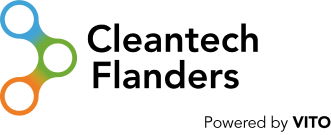Extreme drought and flooding are different sides of the same coin, namely an unbalance between supply and demand of water, intensified by global warming. With the Blue Deal, Flanders is aiming to thoroughly revamp its water system and transform itself from a water-scarce region into a model region for efficient water usage.
The perception of water housekeeping in our region has changed substantially in recent years. Or, to put it better: the seriousness of water stress due to either shortage or excess of water, has only now cut through to the wider population due to various heatwaves, long-lasting periods of drought and – not forgetting – the devastating floods of the summer 2021. Climate models indicate that, although the annual precipitation volume is remaining more or less constant, episodes of extreme precipitation, or the lack of it, are becoming more frequent. In response to this new reality, the Flemish government launched the Blue Deal in 2020. This comprehensive package of measures is intended to transform Flanders from a water-scarce region into a model region for efficient water usage.
Supply, demand and reserves
Water management in the Blue Deal rests upon three pillars: the supply, the demand and the reserves. The demand side is in theory the easiest to manage, as this is fully determined by our collective behaviour. The Blue Deal aspires to make all sections of society responsible for rational water usage. For industry and agriculture, for example, this means that they need to go out in search of opportunities to reduce consumption or to start reusing wastewater using ‘scans’. In doing so, the authorities set a good example by implementing a policy that facilitates the development of the entire package of measures in the Blue Deal.
On the supply side, the Blue Deal strives for greater water infiltration into Flemish soil for making the water stocks more robust, and for a shift in the general mindset towards circular water.
Concerning our water supply, nowadays all the water that we use in a private setting (as drinking water, but also for cooking, washing and cleaning) comes from groundwater reserves and from lakes, canals and rivers. The surface reserves are not very large in our region, however, which means Flanders is at risk of water stress from extreme weather events or from international troubles regarding water management. That is why it is important to focus on the use of alternative water sources: wastewater, rainwater, brackish water and even seawater. Since technologies are available, the challenge lies mainly in the smart coupling of the new concepts with energy and land use.
Retention of water
The high degree of surface hardening in Flanders (16% of our surface) makes that a lot of rainwater is discharged more quickly towards the sea via the sewers. This increases the risk of flooding and at the same time hinders the replenishment of our groundwater supplies. Rendering the surface permeable and the creation of infiltration zones and green belts are therefore important to maintain our groundwater reserves. These zones also have an additional beneficial effect, because they provide cooling. And with more natural cooling, less air conditioning is needed on hot days, reducing power consumption and therefore also water consumption by power plants.
Waterproof Flanders
The Blue Deal aims at making Flanders a waterproof region. Let this also be the name of an ambitious project led by VITO that through three large-scale demos, investigates how a more resilient water supply can be achieved through a combination of smart spatial planning, intelligent management of buffers and circular water networks. In concrete terms, we are going to work at a business park in Tielt, at the fruit growers in Haspengouw and we are investigating extra buffering capacity in natural water basins in the Kempen. The Flanders WaterProof project follows a systems approach in which the main cause-effect relationships within the Flemish water system are mapped, including the interactions with other systems such as energy, nutrition, mobility and health.
The importance of the Blue Deal cannot be overstated. With the Blue Deal, Flanders ensures support and the necessary dynamics. This is essential to make our water system climate-robust.

Inge Genné, Programme Manager ‘Water’ at VITO



